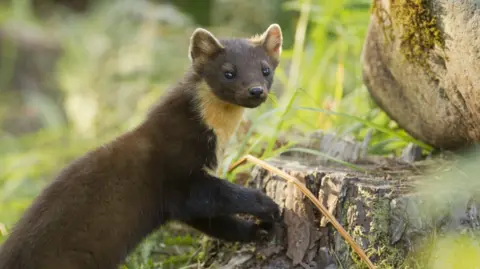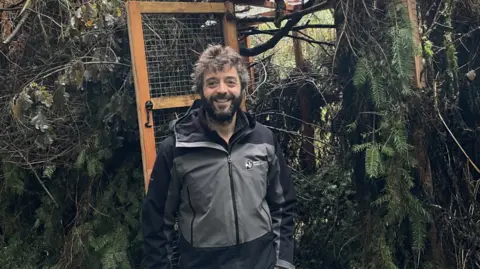Project reviving pine marten populations
 PA Media
PA MediaA decade-long conservation project to restore the fortunes of pine martens across Britain has hit a major milestone.
A collaboration between Vincent Wildlife Trust (VWT) and Forestry and Land Scotland has seen pine martens from the latter's forests boost populations in Wales, Gloucestershire and Devon - with more than 100 animals successfully translocated.
Dr Jenny MacPherson, principal scientist at VWT, said pine martens were once on the brink of extinction because of habitat loss and historical persecution.
"This project has strengthened populations in parts of Britain and helped provide renewed security for these amazing animals," she said.
According to the Woodland Trust, pine martens were once widespread in the UK.
Hunting and woodland clearance meant the species was restricted to just the Scottish Highlands and tiny pockets of Wales and northern England by the 20th century.
The nocturnal animals, which favour woodland areas, are usually chestnut brown with a characteristic pale yellow 'bib' on its chin and throat.

Since work began to establish the feasibility of translocations in 2014, VWT and Forestry and Land Scotland (FLS) have worked together to identify healthy, thriving populations from forests across Scotland that could provide animals to create sustainable populations in previously depleted regions.
Kenny Kortland, wildlife ecologist at FLS, said: "Reaching the milestone of translocating 100 pine martens in a decade is a fantastic example of what can be achieved through dedicated partnership and science-led conservation."
The VWT team oversaw each translocation, FLS explained, ensuring the pine martens were safely and ethically captured, handled and transported under licence from NatureScot.
Reintroductions in England were carried out in collaboration with Gloucestershire Wildlife Trust, Forestry England and the Two Moors Partnership.
Ed Parr-Ferris, a conservation manager with Devon Wildlife Trust working on the project, said the collaboration had "safeguarded biodiversity for future generations."
Follow BBC Gloucestershire on Facebook, X and Instagram. Send your story ideas to us on email or via WhatsApp on 0800 313 4630.
